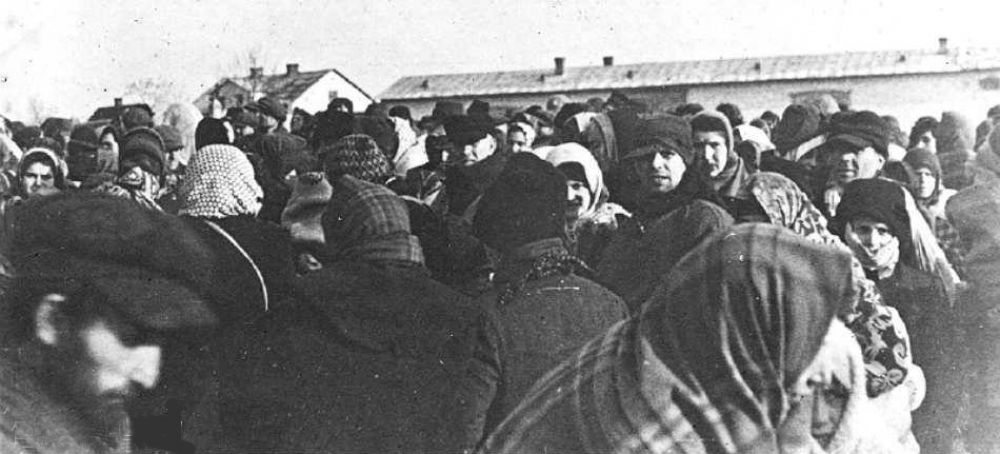- News
- Events
- Oneg Shabbat
- Collections
- Research
- Exhibitions
- Education
- Publishing Department
- Genealogy
- About the Institute
- Bookstore


Deportation of Jews from Zamość, April 1942, Wikimedia Commons
“We know for sure that uncle has the apartment near you almost ready. You have to know about that, maybe you’ll find some way out. You generally need to know that uncle intends, God forbid, to arrange a wedding at your place in the near future, and the apartment is already very nearby, very close to you, prepared”.
“Remember – we are holy offerings, «and if any of it is left until morning» etc.”
– an anonymous author wrote in a June 1942 letter from Włodawa, Lublin district, to a friend in the Warsaw Ghetto. “The apartment” is the Treblinka exterminaton camp still under construction by the Germans. The author didn’t finish the sentence, that the addressees had to have recognised a quote from the Book of Exodus, chapter 12, verse 10:
“if any of it is left until morning, you shall burn it”.
With those words, God is commanding Moses and Aaron to kill a lamb as a sacrifice during Pesach.
![ofiara_list_zw_1.jpg [489.32 KB]](https://www.jhi.pl/storage/image/core_files/2022/6/6/1dff965e125db65677ffac91f9814c0b/jpg/jhi/preview/ofiara_list_zw_1.jpg)
“As you know, we were moved to Grabowiec, or 'Grobowiec' [Tomb], here we encountered the face of death. There is a regulation not to leave the city for 7 days. Imagine our hearts, we live with the expectation of terrible blows for us. Will it be a further journey, will it be some kind of c[oncentration] camp, or will it be death?
The atmosphere in the city is just like before the akedah [holy sacrifice]. Two weeks ago, a big ritual celebration took place, which was attended by over 30 people”
– wrote Icchak from the kibbutz in Werbkowice near Hrubieszów to Henoch Gutman and the leadership of the Hechaluc-Dror youth organization in the Warsaw ghetto on 5 June 1942. Akedah means "holy sacrifice", the author of the letter referred to the sacrifice of Abraham. "A ritual feast attended by over 30 people" is a shooting. As in other ghettos, before and during mass deportations, the Germans carried out executions terrorizing the Jewish population.
![grabowiec_list_zw_1.jpg [497.88 KB]](https://www.jhi.pl/storage/image/core_files/2022/6/6/f18c3de981191e7d04601dedd0063486/jpg/jhi/preview/grabowiec_list_zw_1.jpg)
The Jews from Grabowiec were transported by the Germans to the Sobibór death camp in June 1942, with the exception of the sick and disabled, who were murdered on the spot in the ghetto. From May to November 1942, Jews from Włodawa were deported and murdered in Sobibór.
“The application of crypto-information had no practical significance for the fate of Jewish communities in German-occupied Poland,” writes Dr. Marcin Urynowicz. – “Nothing could save the doomed. Resorting to crypto-information had purely psychological significance; it gave hope that thanks to the transmission of messages, it would be possible to do something, to break out of the circle of helplessness. It also gave a sense of fulfilment of a duty towards family or friends who, regardless of whether they could save themselves or not, were informed of the danger”.
In Jewish letters about the Holocaust, Germans are often referred to as “uncle”, “Mr. Jekiel”, “Swedes”. Hitler was called a “great man”, “high priest”, “capmaker” – because that is what “hitler” means in Yiddish. Goebbels was the “master advertiser”.
______
Sources: Archiwum Ringelbluma, v. 1, „Listy o Zagładzie”, ed. Ruta Sakowska, JHI Publishing, Warsaw 2017; Marcin Urynowicz, „Listy o Zagładzie. Kryptoinformacja”, „Pamięć i Sprawiedliwość” 2002.